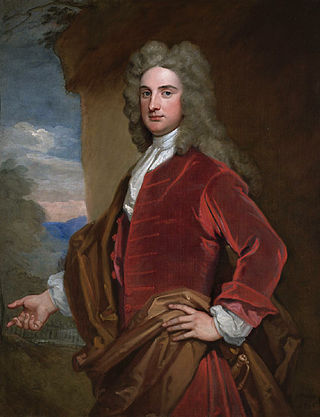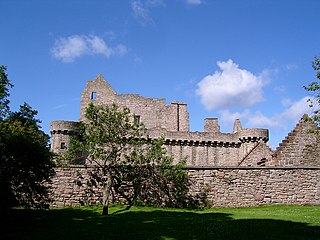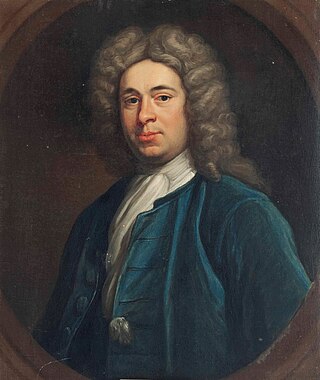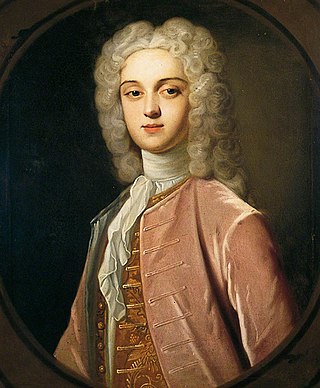Related Research Articles

Richard Edgcumbe, 1st Baron Edgcumbe, of Mount Edgcumbe in Cornwall, was an English Whig politician who sat in the English and British House of Commons from 1701 until 1742 when he was raised to the peerage as Baron Edgcumbe. He is memorialised by Edgecombe County, North Carolina.

Charles Noel Somerset, 4th Duke of Beaufort was a British Tory politician who sat in the House of Commons from 1731 until 1745 when he succeeded to the peerage as Duke of Beaufort.
Robert Dundas of Arniston, the elder, 2nd Lord Arniston (1685–1753) was a Scottish lawyer, and Tory politician who sat in the House of Commons from 1722 to 1737. In 1728 he reintroduced into Scottish juries the possible verdicts of guilty or not guilty as against proven or not proven. He was Lord President of the Court of Session from 1748 to 1753.

Sir John Baird, 2nd Baronet, of Newbyth of Newbyth, Haddington, was a Scottish politician who sat in the House of Commons from 1715 to 1722.

Sir John Rushout, 4th Baronet, of Northwick Park, Worcestershire was a British Whig politician who sat in the House of Commons for 55 years from 1713 to 1768. He was a supporter of Pulteney in opposition to Walpole, and was briefly part of an Administration. He was Father of the House from 1762.
Henry Hyde, Viscount Cornbury, styled Viscount Hyde from 1711 until 1723 and Viscount Cornbury thereafter, also 5th Baron Hyde in his own right, was a British author and politician who sat in the House of Commons from 1732 until 1750 when he was raised to the House of Lords by writ of acceleration. He was involved in Jacobite intrigues in the early 1730s.
John Talbot was a British judge and Whig politician who sat in the House of Commons from 1734 to 1756.

John Wallop, Viscount Lymington was a British politician, styled Hon. John Wallop from 1720 to 1743.

Sir Alexander Gilmour, 1st Baronet (1657-1731) of Craigmillar Castle, Edinburgh, was a Scottish politician who sat in the Parliament of Scotland from 1690 to 1702.

Sir John Evelyn, 2nd Baronet was a British courtier and Whig politician who sat in the House of Commons for 40 years from 1727 to 1767.
Sir John Crosse, 2nd Baronet, of Millbank, Westminster, and Rainham, Essex, was a British Whig politician who sat in the House of Commons between 1727 and 1754.

William Noel was an English barrister, judge and politician who sat in the House of Commons for 35 years from 1722 to 1757.
Sir Edward Bayntun-Rolt, 1st Baronet (1710–1800) was a British landowner and Whig politician who sat in the House of Commons for 43 years from 1737 to 1780. His election in 1741 was instrumental in the downfall of Sir Robert Walpole's premiership.
Sir James Grant, 6th Baronet was a Scottish Whig politician who sat in the House of Commons from 1722 to 1747. He was Chief of Clan Grant from 1719 until his death.
Sir John Ramsden, 3rd Baronet (1699–1769) of Byram and Longley Hall, Yorkshire, was a British landowner and Independent Whig politician who sat in the House of Commons from 1727 to 1754.

Sir Arthur Forbes, 4th Baronet (1709–1773), of Craigievar, Aberdeen, was a Scottish Whig politician who sat in the House of Commons from 1732 to 1747.
Chomley Turner (1685–1757) of Kirkleatham, Yorkshire was a British landowner and politician who sat in the House of Commons between 1715 and 1747.
James Cocks, of Reigate, Surrey, was a British lawyer and Whig politician who sat in the House of Commons between 1707 and 1747.
Francis Gashry of Hollybush House, Parsons Green, London was a British official and Whig politician who sat in the House of Commons from 1741 to 1762.

Sir Miles Stapylton 4th Baronet, of Myton, Yorkshire, was a British landowner and politician who sat in the House of Commons from 1734 to 1750. He was initially a Tory but after joining the Prince of Wales party in the mid 1740s, went over to the Whigs.
References
- 1 2 Cokayne, George Edward, ed. (1904), Complete Baronetage volume 4 (1665-1707), vol. 4, Exeter: William Pollard and Co, retrieved 16 March 2019
- ↑ "GILMOUR, Sir Charles, 2nd Bt. (d.1750), of Craigmillar, Edinburgh". History of Parliament Online. Retrieved 16 March 2019.